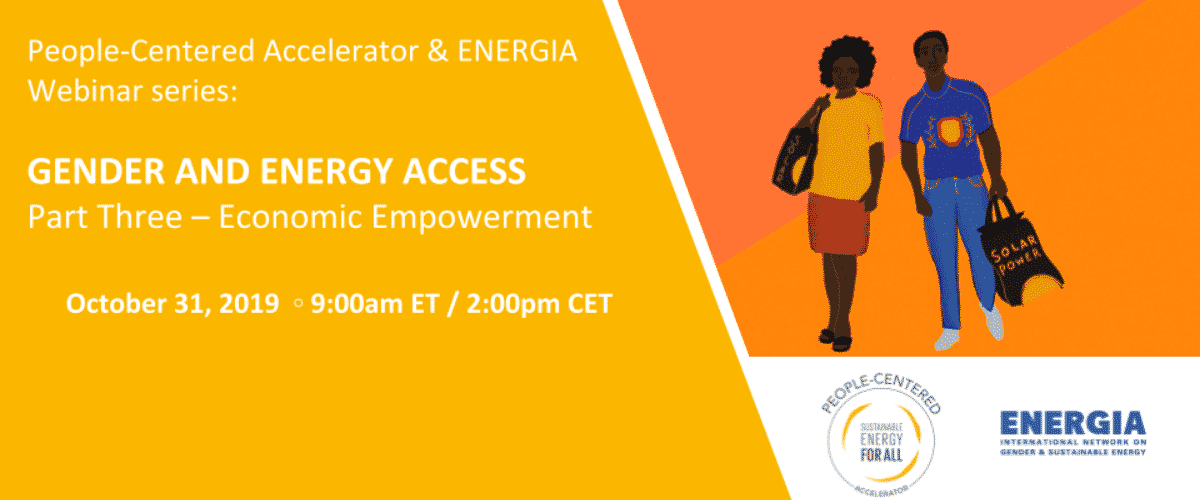On October 3, 17 and 31, ENERGIA and SEforALL’s People-Centered Accelerator, organised a three-part webinar series on Gender and Energy Access. The series focused on our five-year Gender and Energy Research programme (2014 – 2019). The last webinar included findings from our Women’s Economic Empowerment (WEE) Programme.
The research programme aimed to generate and analyse empirical evidence on the nexus between gender, energy and poverty, to inform energy policy and practice. Specifically, the research explored the linkages on gender, energy and poverty in six thematic areas:
- Electrification
- Productive uses of energy
- Energy sector reform
- The role of the private sector in scaling up energy access
- The political economy of energy sector policies
- Women’s energy entrepreneurship.
This programme was performed by nine teams involving more than 70 researchers, across 12 countries with the cooperation of 29 partner organisations. It was unique in its scale and first of its kind, urged by the need to reduce the existing research gap and have an extensive understanding based on evidence, beyond case studies. The findings are presented in seven reports and can be accessed on our website together with a synthesis report, which presents a prioritised selection of key messages and associated policy implications. Our publication “Supporting last-mile women energy entrepreneurs: What works and what does not” based on our WEE programme can also be found here.
In the webinar series, the presenters highlighted specific aspects of their studies and provided insights on the differentiated impacts of access to energy and energy services, policies and subsidies for women and men. In case you missed it, here’s a recap where we have summarised the key takeaways. The slides and the recording can be found here.
Webinar 3: Gender and Energy Access
Part three – Economic Empowerment
In the third and final webinar of our series, researchers (RA5, RA7) presented lessons learned from research on women’s entrepreneurship. Recent evidence that shows investing in women energy entrepreneurs is good for women, their families, and the growth of their businesses. In addition, the final presentation included a reflection on experience and lessons learned from practitioners on how to best support women energy entrepreneurs in order to maximize their success (Read our publication “Supporting last-mile women energy entrepreneurs: What works and what does not”).
A literature review on women’s entrepreneurship and its contribution to SDG7
The first presentation, by Amanda Elam from the Babson College, focused on the impact of entrepreneurship on women’s lives and how this contributes to SDG7. The research team undertook a systematic literature review of policy papers, grey literature and academic peer-reviewed papers on the interlinkages between gender and entrepreneurship in the energy sector. Specifically, they looked at evidence that women’s energy entrepreneurship advances energy access for all and is good for women and families, and investigated the best practices to support women’s entrepreneurship within the energy sector. The research suggests to think very carefully about the type of entrepreneurship, because each type has different resource environments, involves different types of market factors and customer value propositions. It also recommends to consider the gender concentration by industry and business types. Women generally start businesses in less profitable markets. The research shows that family power dynamics influence women entrepreneurship, business ownership and control and that, when equally trained, women make excellent business leaders. In this light, personal agency and empowerment training is crucial for women and last mile groups.
Women’s inclusion in the energy sector: Impacts and benefits
Rebecca Klege from the Environmental Economics Policy Research Unit (EPRU) at the University of Cape Town presented RA5 insights on involving women as entrepreneurs in the renewable energy sector and how this impacts businesses. The research, carried out in Rwanda, showed similar business performance between male and female groups of village level enterprises in charging of LED lights. The evidence revealed that household consumption and expenditure levels, one of the best measures of poverty, increased for the entrepreneurs, The study into competitiveness, found that women operating as village level entrepreneurs do not shy away from competition and under competitive situation they perform as well as men. Overall this research program has indicated various effects resulting from women’s participation in the energy value chain, including:
- Improved access to lighting (allowing females to work after dark and males to spend time on finding food for livestock, while children benefit from additional time to study)
- Supplementary income (e.g. increased food purchases amongst female VLEs and increased leisure expenditures as well as savings amongst male VLEs)
- An elevated status in the community
Women’s Economic Empowerment: ENERGIA self-reflection on the Programme
The third presentation saw Soma Dutta, Senior Technical Advisor at ENERGIA showcasing our four-year journey on the field with five leading partners working in developing women’s enterprises in the renewable energy sector in remote areas across seven countries. Under the programme, ENERGIA and partners supported 4,153 women, delivering clean energy products and services to more than 2.9 million consumers, mostly in rural areas and in low-income communities.In 2018, ENERGIA and partners undertook a self-reflection of the journey, analysing strategies, successes and failures of the programme, from an early stage of the implementation to the business development. These lessons, collected in the publication “Supporting last-mile women energy entrepreneurs: What works and what does not”, go beyond individual strategies and may be relevant for future implementations:
- Setting up a comprehensive WEE programme requires time, commitment and core resources
- When programming, aggregating efforts is important
- An enabling environment is as important as direct support to the entrepreneurs
- An ecosystems approach is central to women’s enterprise development
- Access to capital is critical, but must be accompanied by a combination of other measures.
The slides and the recording of this webinar can be found on our website. You can read the key takeaways from the first webinar here and from the second webinar here. More information on the research teams involved in this webinar can be found here.











Follow us on: